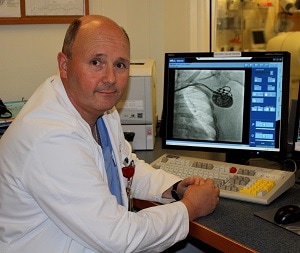Cardiovascular Treatment
Depending on the outcome of your diagnostics, cardiovascular treatment may be necessary. Medical professionals in the Cardiovascular Department work closely with your cardiologist and primary care physician to ensure the most effective treatment plan is implemented. In some cases, treatment may involve nutrition consultation with Milford Regional’s registered dietitians through Outpatient Nutrition Services. Your physician may also recommend other lifestyle changes that include smoking cessation, an exercise program and stress reduction as well as heart medication and monitoring. Sometimes, treatment may also require the implantation of heart regulating devices.
In more serious cases, where interventional therapies are indicated including cardiac stents, balloon angioplasty or surgery, the cardiovascular team at Milford Regional will quickly facilitate transfer to a tertiary care facility by ambulance or helicopter in a seamless and expeditious manner.
Rest assured that these cardiovascular professionals will work closely with you, your family and your primary care physician to access the treatment that is right for you.
Electrical Cardioversion
An electrical cardioversion is a medical procedure (under sedation) in which the heart receives a brief electrical shock to change an abnormal heart rhythm back to a normal rhythm. This is used for atrial fibrillation patients.
Pacemaker Insertion
A pacemaker insertion is prescribed when the heart beats too slowly. A pacemaker is implanted into the body, usually in the upper chest, near the shoulder. It keeps track of the heart’s electrical activity and helps the heart function better with a more regular rhythm. If the pacemaker senses the heart is beating too slowly or pausing too long between beats, it delivers electrical impulses that stimulate the heart and keep it beating at the proper speed.

Milford Regional is the second hospital statewide to implant a new cardiac pacemaker that allows patients to have magnetic resonance imaging (MRI) tests. Prior to this technology, patients that had a pacemaker could not undergo an MRI. The largest demographic impacted by this diagnostic limitation are those age 65 and older who comprise 86% of those with a pacing system. This group is twice as likely to need an MRI since it is the gold standard diagnostic tool for neurologists, oncologists and orthopedic surgeons.
Implantable cardioverter-defibrillator
(ICD)An implantable cardioverter-defibrillator (ICD) treats life-threatening rapid heart rhythms. An ICD is a small electronic device that is implanted into your body to monitor your heart rhythm continuously. If it senses a dangerously fast heart rhythm, the ICD delivers electrical impulses or shocks to restore a normal heart rhythm.Milford Regional’s cardiologists are credentialed by the Heart Rhythm Society to ensure patients receive the highest standards of safety and care in the implantation of ICDs.Depending upon your circumstances, cardiovascular treatment may include recommended lifestyle changes, such as increased exercise, a more healthful diet and medication as well as heart regulating devices.
 Cardiac Pacemaker
Cardiac Pacemaker